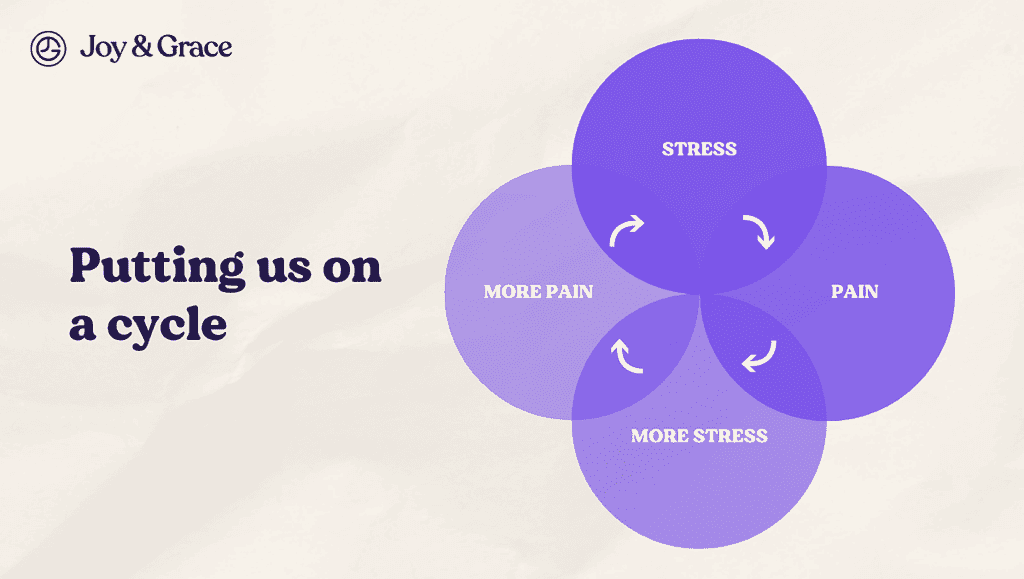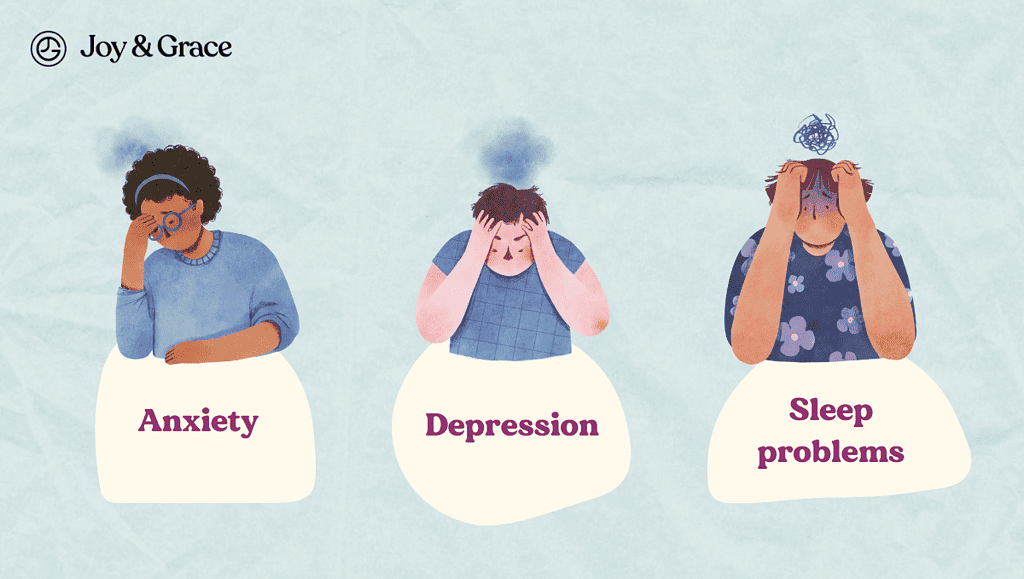Are you experiencing neck discomfort and pain?
You may be surprised to learn that mental stress can be a major contributor to physical pain in the neck and back. In this article, we'll explore how mental stress induces neck and back pain and provide easy tips for stress management.
We'll also cover the connection between depression and anxiety, and neck pain.
If you know how your mental and physical health is connected, you can take steps to ease your pain and improve your overall health.
Can Mental Stress Cause Neck And Back Pain?
Studies suggest that mental stress is a significant risk factor for developing neck and back pain.
It is important to note that there’s no tool or procedure to measure and prove a specific painful condition is caused by mental stress alone.
That’s why studies can not conclude that neck and back pain, for example, is directly caused by mental stress. Only an association between conditions can be reported.
Hence, mental stress is considered one of the possible causes of neck and back pain.
With that being said, studies are very clear that there’s an obvious link between mental stress and neck and back pain.
One systematic review study, particularly, is very extensive on this topic.
Systematic review studies are "study of multiple studies" types of research. They look at various studies that have been done on the topic and summarize the current knowledge.
The study confirmed that most previous studies found mental stress strongly contributes to neck and back pain.
Furthermore, the data clearly show that mental stress is crucial in transforming acute pain into chronic pain.
The study also says other non-physical things are responsible for developing neck and back pain.
Things like a person's beliefs, thoughts, and attitudes about pain, disability, and how healthy they think they are, seem to be very important.
There is also a social part, where family and work problems seem to be important, even though the data aren't as strong.
Lastly, a behavioral domain shows up, which includes important parts like how people deal with pain and how they do things
Overall, these findings highlight the multi-dimensional basis of neck and back pain. They also stress how important it is to deal with stress as a possible cause of neck and back pain and use techniques to deal with stress as a treatment.
How Mental Stress Induces Neck And Back Pain
Mental stress induces neck and back pain in somewhat complicated ways:
- Altering our pain sensitivity
First, studies say stress contributes to neck and back pain by altering our sensitivity to pain, making us more irritable.
That applies to some of the population, at least.
The medical term for this condition is “hyperalgesia.” Hyperalgesia basically means abnormally increased sensitivity to pain.
This could be the case when you’re feeling a really stiff neck all of a sudden in stressful times.
On the other hand, in some people, mental stress seems actually to inhibit pain.
Kind of conflicting, but that’s what some studies currently suggest.
But pain inhibition is good, right? How could we have neck pain if mental stress is actually inhibiting the pain?
Well, it’s kind of a two-edged sword.
As opposed to “hyperalgesia,” pain inhibition could contribute to neck pain in a more delayed way.
Mental stress inhibiting the pain could lead us to overwork ourselves. It could also make us work on a really bad posture without feeling it first.
Obviously, the downside is that as soon as the mental stress is relieved, our neck will start aching from the huge amount of pressure we’ve put it into.
Bottom-line is mental stress alters our pain sensitivity levels, ultimately doing us no good.
- Putting us on a cycle

And second, stress and neck and back pain “make each other worse.”
The stress can lead to pain, which in turn leads to more stress, which in turn leads to more pain, which leads to…You get the idea.
That is the case for most of the “psychological” factors associated with neck and back pain.
What Does Neck Pain From Stress Feel Like?

Neck pain accompanied by excessive thoughts of worry and erratic thoughts is what neck pain from stress could feel like.
That’s especially true when the pain shows up primarily during new and/or demanding periods of life.
If you’re already suffering from neck pain, mental stress could increase the levels or the duration of the pain.
That’s another way how neck pain from stress could feel like in chronic pain sufferers.
As to what neck pain from stress literally feels like, there is no clear answer, as the pain could be:
- Dull
- Achy
- Sharp
- Stabbing
- Shooting
- Burning pain
Can Depression And Anxiety Cause Neck Pain?

Research shows that depression and anxiety are also big risk factors for neck pain, along with mental stress. Another common risk factor is having sleep problems.
- Anxiety
Research shows that some types of anxiety disorders are more strongly associated with neck pain than others. Generalized anxiety disorder and post-traumatic disorder are most linked to neck and back pain. Social phobia and panic disorders seem to be less linked.
- Depression
Mood disorders, especially depression, have been linked to disabilities and long-term neck pain. In fact, some articles say that depression is a very important risk factor for developing long-term back or neck pain.
- Sleep problems
As with all of the “psychological” risk factors, the link between how well you sleep and neck pain goes both ways, as each can cause the other. Studies among adolescents have shown a strong link between not getting enough or good sleep and having a higher chance of getting neck pain.
Overall, general well-being is essential to prevent or alleviate neck and back pain. One factor can lead to another, and proper prevention and management are critical.
How Long Does Neck Pain FROM ANXIETY Last?
In some cases, neck pain caused by anxiety can go away quickly if you learn how to relax or deal with your anxiety. In other people, it may last longer and need professional help, like therapy or medicine.
Still, how long anxiety-related neck pain lasts depends on many things.
Things like how bad the anxiety is, how different each person is, and if you're receiving any treatment are key factors.
If you have neck pain and suffer from anxiety, you should see a doctor to get an accurate diagnosis and treatment plan.
Easy Tips To Relieve Stress-Related Neck And Back Pain
The good news is that some techniques and strategies help manage and prevent stress by any cause. We can also use them to relieve and avoid stress-related neck and back pain.
Here’s a short list of stress prevention and relief techniques that Harvard University also recommends:
- Meditation or deep breathing techniques.
When you're stressed, you breathe quickly and shallowly and think randomly.
So, try to take slow, deep breaths to relax your muscles, slow your heart rate, and quiet your mind.
Here’s a simple breathwork exercise you could try:
- Find a comfortable seated position, either on a chair or on the floor, with your back straight.
- Close your eyes and bring your attention to your breath.
- Breathe deeply and slowly through your nose, filling your lungs completely with air.
- Hold your breath for a few seconds.
- Exhale slowly through your mouth, emptying your lungs completely.
- Repeat this pattern for 5 minutes or more, focusing on your breath and letting go of any distractions.
- When you feel ready, open your eyes and return to your normal activities, feeling refreshed and relaxed.
Note: You can also experiment with counting your breaths, counting to 4 on the inhale and counting to 4 on the exhale. This helps you focus on your breath and regulate its pace.
If you want a visual guide, we would also recommend watching this short mindful breathing exercise.
Furthermore, some exercises, like yoga and tai chi, stress deep breathing and keeping your mind clear.
Researchers have also found that learning to meditate may keep important DNA structures from breaking down.
These mentioned structures, called telomeres, tend to get shorter with age and in people under constant stress. That could kill cells and cause inflammation. That leads to a higher risk of age-related dementia and heart disease.
Some studies have found that meditating is linked to longer and more active telomeres. That is because anxiety, chronic stress, and cortisol levels go down when you meditate.
- Trying to find a good balance between work and other things in life
Use your vacation and personal time, or just set aside an hour a day.
Getting away from the stress of work every once in a while can do a lot to reduce stress.
In addition, it can boost productivity and lower the risk of physical and mental illnesses that are linked to workplace burnout.
- Plan something fun to do or a hobby at least once a week
Some good ways to relieve stress are gardening, reading, listening to music, getting a massage, hiking in nature, or cooking a favorite dish.
- Good sleep hygiene
As we mentioned earlier, stress can make you more alert, making it hard to fall asleep.
That can keep a person from getting into the deeper stages of sleep when the body repairs and grows new tissue and helps the immune system stay healthy.
In particular, the REM (rapid eye movement) stage of sleep helps keep your mood in check and helps you remember things.
Aim for 7–9 hours of sleep each night by slowing down about 30 minutes before bedtime. Using the other tips above to deal with stress can also help you sleep better.
- Counseling for mental health or other kinds of social support
Stress can get worse when you feel alone. It can help to talk about feelings and worries with someone you can trust. Knowing you're not alone and that your feelings are normal can help you feel less stressed.
- Healthy diet
A well-balanced diet can support a healthy immune system and repair damaged cells.
Early research shows that some fats, such as omega-3 fats, and vegetables, may help keep stress hormone levels in check.
If you often eat fast food because you are too tired or busy to make meals at home, you might want to try meal planning.
Meal planning saves you time in the long run, helps you eat more balanced, healthy meals, and keeps you from gaining weight.
- Mindful eating
When we "stress-eat," we eat quickly and don't pay attention to what or how much we're eating. That can make us gain weight.
Mindful eating reduces stress by getting people to take deep breaths and choose foods with care. It also emphasizes paying attention to the meal and chewing the food slowly and thoroughly.
That makes the meal more enjoyable and makes it easier to digest.
- Regular exercise
The levels of stress hormones and blood pressure will go down when you work out.
Aerobic exercise, like walking and dancing, raises your heart rate and breathing rate, letting more oxygen get to your cells. That makes muscles, including the heart, less tense.
Takeaway
Mental stress can have a significant impact on the physical body, particularly in the form of neck and back pain.
Studies have shown that people who experience a lot of stress are more likely to have chronic pain in these areas.
So, it's important to learn how to deal with stress by doing things like deep breathing, meditation, and exercise.
Other things are also important, such as finding a balance between work, rest, and leisure time. Additionally, learning to manage time efficiently can also help to reduce stress levels and, in turn, neck and back pain.
That's easier said than done, you might say. And we understand. We're aware that sometimes things move so fast that it's hard to even think about changing bad habits because they get in the way of our daily lives.
So our recommendation would be, albeit a bit of cliche: Do things one step at a time. Try incorporating the stress-management tips of this article little by little. Day by day.
One day, you will find yourself actively working toward yourself, pain-free and happy.














